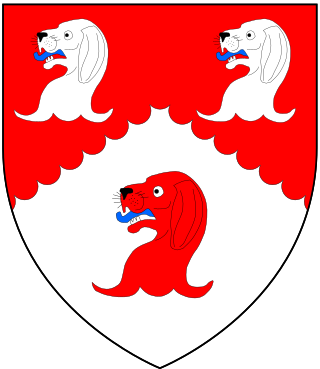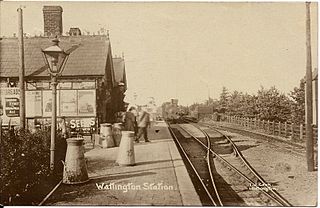Related Research Articles

Kendrick School is a selective girls' grammar school situated in the centre of Reading, Berkshire, UK. In February 2011, Kendrick became an Academy.

Robert Molesworth, 1st Viscount Molesworth, PC (Ire) was an Anglo-Irish politician, peer and writer.
The title Earl of Bolingbroke has been created twice, once in the Peerage of England and once in the Jacobite Peerage.

Watlington is a small market town and civil parish about 7 miles (11 km) south of Thame in Oxfordshire, near the county's eastern edge and less than 2 miles (3 km) from its border with Buckinghamshire. The parish includes the hamlets of Christmas Common, Greenfield and Howe Hill, all of which are in the Chiltern Hills. The 2011 Census recorded the parish's population as 2,727.

Lieutenant-General Thomas Wentworth, 1st Earl of Strafford, KG, also known as in Jacobite Peerage as the 1st Duke of Strafford and 3rd Baron Raby from 1695 to 1711, was an English peer, diplomat and statesman who served as First Lord of the Admiralty.
Watlington may refer to:

Christmas Common is a hamlet in Watlington civil parish, Oxfordshire about 7+1⁄2 miles (12 km) south of Thame in Oxfordshire, close to the boundary with Buckinghamshire. The hamlet is 812 feet (247 m) above sea level on an escarpment of the Chiltern Hills. Because of its elevation, Christmas Common has two radio masts that are prominent local landmarks.

Sir Charles Duncombe of Teddington, Middlesex and Barford, Wiltshire, was an English banker and Tory politician who sat in the English and British House of Commons between 1685 and 1711. He served as Lord Mayor of London from 1708 to 1709. He made a fortune in banking and was said to be worth £400,000 later in life, and the richest commoner in England on his death.

Richard Smallbrooke was an English churchman, Bishop of St David's and then of Lichfield and Coventry.

William Bromley of Baginton, Warwickshire, was an English Tory politician who sat in the English and British House of Commons between 1690 and 1732. He was Speaker of the House of Commons of Great Britain from 1710 to 1713 and Secretary of State for the Northern Department from 1713 to 1714.

East Reading is a main locality of the town of Reading in the English county of Berkshire. Its centre is known as Cemetery Junction, after Reading Old Cemetery.

The Watlington and Princes Risborough Railway was an independent English railway company that opened a line between the Oxfordshire towns of Watlington and Chinnor in 1872. The 9 mi (14 km) branch, which connected to the Great Western Railway (GWR) at Princes Risborough, did not make any money and was taken over in 1883 by GWR resulting in its investors sustaining considerable losses.

Watlington House is a 17th-century building, with a large walled garden, in the town of Reading in the English county of Berkshire. The building is brick built and is reputed to be the oldest surviving secular building in the town. It is a listed building, being listed grade II*. The information on the Historic England website is https://historicengland.org.uk/listing/the-list/list-entry/1321898
Paulet St John, 3rd Earl of Bolingbroke, known as Paulet St John until 1688, was an English politician who sat in the House of Commons from 1663 to 1685. He inherited the peerage as Earl of Bolingbroke in 1688.
James Smith (1645–1711) was an English Roman Catholic prelate, Vicar-Apostolic of the Northern District under James II of England.
Edward Vaughan, of Glan-y-Llyn, Merionethshire and Llwydiarth, Montgomeryshire, was a Welsh Tory politician who sat in the English and British House of Commons for 43 years from 1675 to 1718. He was briefly Father of the House.
Willoughby Hickman (1688–1712) was a British politician who sat in the House of Commons from 1711 to 1712.
Elizabeth Bray Allen also known as Elizabeth Bray Allen Smith Stith operated a large plantation after the death of her first husband, Arthur Allen. After the death of her second husband, she operated both the Allen and Smith estates. She provided the direction and funds to establish a free school for poor boys and girls in Smithfield, Virginia.
References
- ↑ "A Brief History of Watlington House". Trustees of Watlington House. Retrieved 13 September 2010.
- ↑ Phillips, Daphne (1980). The Story of Reading. Countryside Books. p. 138. ISBN 0-905392-07-8.
- ↑ "Haunted Reading". BBC. July 2003. Retrieved 13 September 2018.